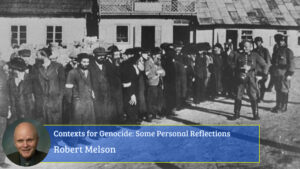GUEST ESSAY

 By Robert Melson on January 27, 2024
By Robert Melson on January 27, 2024
Questions concerning the legal definition of genocide, war crimes, and crimes against humanity, and the punishment of the perpetrators have animated jurists of the Armenian Genocide, the Holocaust, Cambodia, Rwanda, and Yugoslavia [1]. Such questions are being raised again with respect to the contemporary Russian invasion of Ukraine, the Hamas massacre in Israel of October 7, 2023, and the Israeli response in Gaza. The question of causality, how and why does genocide like the Holocaust happen is a different question. It is one that has haunted me all my life.
My approach as a political historian has been to compare the Holocaust to other instances of genocide in the modern era, especially to those cases such as the Armenian Genocide of 1915, Cambodia 1975, and Rwanda 1994. In each such instance the perpetrators attempted to exterminate communities that were familiar members of their own societies. It is such domestic destruction that differentiates modern or contemporary genocide from other instances in the distant past or colonial genocide in the 19th century.
Consider the Holocaust: During a crisis for German democracy, the Nazis, a revolutionary party, came to power in 1933, establishing a dictatorship under Adolf Hitler. They were motivated by an ideology of radical biological racism at the core of which was antisemitism. They launched WWII by attacking Poland on September 1, 1939. They then invaded the Soviet Union on June 21, 1941, and in conjunction with that attack, they launched the Holocaust, not only in Germany but throughout the lands they had conquered. They started by sending out special killing squads called Einsatzgruppen that followed the army to round up and shoot Jewish men, women, and children in areas that the German army had conquered.
Closer to home, on October 12, 1941 such a killing squad rounded up and massacred most of the Jews of Stanisławów (now renamed Ivano Frankivsk) a small town in Ukraine where my parents and I were staying with my grandfather. They did so by mass shooting and burying the corpses in open pits on the outside of town. We survived because my parents refused the German orders to assemble in the center of town, and we fled and hid with Christian friends. I was four at the time. We survived by acquiring false papers of identity, allowing us, a Jewish family, to impersonate Polish Catholics for the duration of the war. I tell this story in more detail in False Papers (University of Illinois Press, 2000) my family memoir.
By 1942 the Nazis realized that a more efficient way of exterminating people was by gassing them in gas-chambers especially designed for the task of mass-murder. To that end they constructed six killing centers in Poland. The best known is Auschwitz outside of Cracow.
The Nazi project of exterminating the Jews of Europe, which they called The Final Solution, was largely successful. Especially in eastern Europe, where millions of Jews had lived, there are now a few thousand survivors, remnants of once thriving communities. In Poland, where I was born, there are a few thousand Jews left, out of a population of three million.
The Nazis managed to kill six out of nine million European Jews. But Jews were not the only ones who were killed. Roma or Gypsies too were slated for murder or enslavement so were millions of Poles, Russians, Ukrainians, Yugoslavs, Czechs and others. The difference is that non-Jews were not targeted for extermination, what the UN calls “genocide in whole.”
Why did this murderous episode, which we call the Holocaust occur? Three elements come to mind: 1. A revolutionary party seized state power during a crisis. 2. The revolutionaries were motivated by an ideology that sought radically to transform the political community by eliminating a national, ethnic, racial, or religious minority that had been part of the same community for centuries, and 3. The revolutionaries were active in a war that facilitated and made legitimate the project of genocide for the perpetrators.
These three elements, revolution during a crisis, an ideology that targets a minority for extermination, and war were present in the Holocaust, but they were also present in the Armenian Genocide of 1915, the Cambodian genocide under the Khmer Rouge of 1975, and Rwanda in 1994. It is not the case that all instances of genocide follow that pattern. The total or partial destruction of native peoples by invaders follows another pattern. Nor, of course, do all revolutions lead to genocide. Some even produce successful liberal democracies in which majorities and minorities can live in peace and mutual respect. How to understand the motivations and conditions that lead people to commit mass-murder, how to prevent genocide and crimes against humanity, and how to judge the perpetrators are life-and-death problems that are with us still.
ABOUT THE AUTHOR:
 ROBERT MELSON
ROBERT MELSON
Emeritus Professor of Political Science, Purdue University and Clark University; Author “False Papers: Deception and Survival in the Holocaust”
Robert Melson is the Professor Emeritus of Political Science at Purdue University and Clark University. As a political historian and political scientist, his primary area of expertise includes revolutions, ethnic violence and comparative genocide. He was the President of the International Association of Genocide Scholars (IAGS) from 2003-2005.